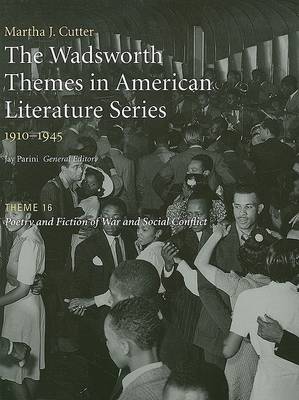Wadsworth Themes American Literature
2 total works
The first thematic series published for American literature, THE WADSWORTH THEMES IN AMERICAN LITERATURE SERIES is currently comprised of 21 themes spanning the time period normally covered in the two-semester American literature survey course--1492 to the present. Each carefully edited booklet centers on a core issue of the period with attention given to the development of key themes. Each thematic booklet offers an introductory contextual essay, a variety of literary perspectives, headnotes and footnotes, along with a variety of visual elements. Martha J. Cutter--a scholar of considerable range and achievement who now teaches at the University of Connecticut--edits the sequence of booklets dealing with the modern era, 1910-1945, a period of pivotal importance in American history and culture. The American empire came into its own in this era, recognized its muscles, and began to flex them--in ways productive and (at times) destructive. Cutter charts the struggle between the sexes in a compelling range of texts. The subject of class and its impact on how people viewed themselves is explored in a selection of works that deal with issues of class, money, and power. The so-called New Negro Renaissance occurred during this period, a revival and consolidation of writing in a variety of genres by African Americans. And, as they must, literary selections from both world wars occupy a central place in one thematic booklet.
The first thematic series published for American literature, THE WADSWORTH THEMES IN AMERICAN LITERATURE SERIES is currently comprised of 21 themes spanning the time period normally covered in the two-semester American literature survey course--1492 to the present. Each carefully edited booklet centers on a core issue of the period with attention given to the development of key themes. Each thematic booklet offers an introductory contextual essay, a variety of literary perspectives, headnotes and footnotes, along with a variety of visual elements. Martha J. Cutter--a scholar of considerable range and achievement who now teaches at the University of Connecticut--edits the sequence of booklets dealing with the modern era, 1910-1945, a period of pivotal importance in American history and culture. The American empire came into its own in this era, recognized its muscles, and began to flex them--in ways productive and (at times) destructive. Cutter charts the struggle between the sexes in a compelling range of texts. The subject of class and its impact on how people viewed themselves is explored in a selection of works that deal with issues of class, money, and power. The so-called New Negro Renaissance occurred during this period, a revival and consolidation of writing in a variety of genres by African Americans. And, as they must, literary selections from both world wars occupy a central place in one thematic booklet.

